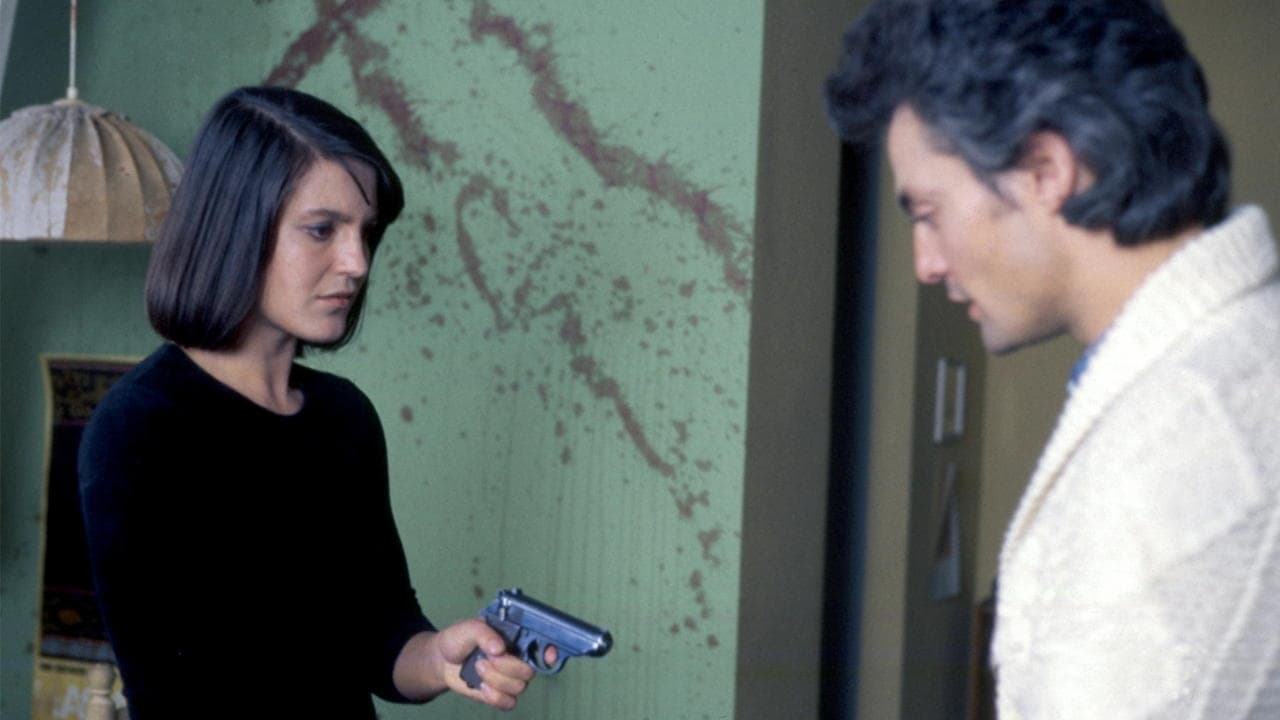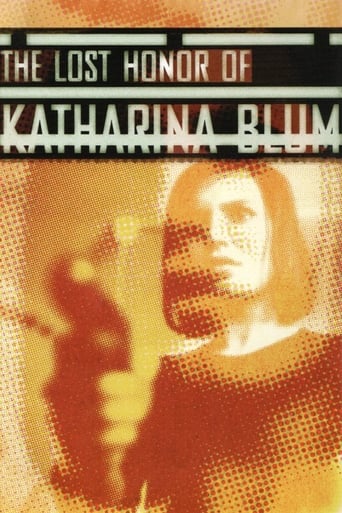Micah Lloyd
Excellent characters with emotional depth. My wife, daughter and granddaughter all enjoyed it...and me, too! Very good movie! You won't be disappointed.
Yash Wade
Close shines in drama with strong language, adult themes.
Raymond Sierra
The film may be flawed, but its message is not.
Phillipa
Strong acting helps the film overcome an uncertain premise and create characters that hold our attention absolutely.
Horst in Translation (filmreviews@web.de)
"Die verlorene Ehre der Katharina Blum" or "The Lost Honor of Katharina Blum" is a West German movie from 1975, so this one already had its 40th anniversary last year. the title certainly sounds like a Rainer Werner Fassbinder movie and the time when this came out also fits, but actually this is a film directed by Volker Schlöndorff with his wife Margarethe von Trotta, her first directorial effort, and the duo also adapted Heinrich Böll's novel together for the screen here. The lead actress is played by Angela Winkler around the age of 30. It was not her first successful performance, but maybe her first career-defining. She won a German Film Award for her turn here. The supporting cast consists of a bunch of male actors who were all among Germany's finest around that time and are still very well-known today, such as Mario Adorf, Jürgen Prochnow, Dieter Laser and Heinz Bennent.This 105-minute movie is about a woman who really does nothing wrong, yet has to face severe consequences for her actions, which ultimately drive her to becoming a criminal herself. Winkler's character has a one-night stand with a terrorist. The next morning he is gone and police forces rush into her apartment. She gets taken to jail like a criminal and from that moment on not only struggles with police authorities, but also with the press, especially one particularly persistent journalist (Laser), who is not even scared of harassing the main character's very sick mother. The ending is particularly telling with the eulogy on freedom of press and the bad guy becoming a martyr, although it becomes obvious that this film is actually making a statement for the opposite site, namely for individual freedom and the right of not being harassed by press when you just want your calm.I quite enjoyed the watch here. The film gets a bit weaker after the first hour when it moves a bit away from Winkler's, Laser's and Adorf's characters, certainly the most interesting, but the last 15 minutes make up for it again. I am generally not too big on Schlöndorff's or von Trotta's works such as "Young Törless" or "Hannah Arendt" and I also find "The Tin Drum" vastly overrated, but I think the spouses reached a convincing result with their collaboration here. Maybe they should have just made more films together. "Die verlorene Ehre der Katharina Blum" is clearly worth checking out, especially for Winkler's and Laser's performances. Give it a chance.
Lee Eisenberg
Grace Kelly once said: "There is freedom of the press, but not much freedom from it." "The Lost Honor of Katharina Blum" shows that to be all too true. Katharina Blum (Angela Winkler) is a young woman in West Germany who has a brief fling with a man who turns out to be a left-wing terrorist. The press, ever eager to find stories to sell, sensationalizes the whole thing to make Katharina look like a terrorist, destroying her reputation in the process.The movie also poses the question of quantity vs. quality. You may or may not have heard of Germany's economic miracle. Kaputt after WWII, Germany quickly rebuilt and went on to become Europe's largest economy. But what does it really mean? Katharina's apartment building looks pretty fancy on the outside, but her apartment looks kind of dilapidated; maybe the "economic miracle" has been a facade all along. Either way, this is a movie that everyone should see.
mdm-11
This is one of a handful of German productions of the 1970s critically acclaimed by world cinema. "Die verlorene Ehre der Katerina Blum" tells of the seemingly innocent love affair of a young woman with a man who turns out to be a fugitive bank robber. Twisting and turning the story to make it more "readable" a tabloid reporter shamelessly destroys the woman's reputation, even leading to her arrest as an "accomplice" to the crimes committed by her "boyfriend".The film shows in detail how the situation impacts many people, including Katerina's employers, neighbors, family memebers. All speak highly of her, yet the newspapers always manage to print distorted facts, embellishments and outright lies. The ending, though unexpected and shocking, will satisfy the viewer, who by now completely empathises with the title character who had been "railroaded" by the press for no other purpose than to sell more papers. A five star classic.
JossJoss5000
I read before the novel I saw the film (in my german class) and I have to say this adaption is way better than the book. The book by Heinrich Böll is not easy to read, it's actually very boring and sometimes you just want to throw it at the wall because Böll often just philosophies about some unimportant things. The film concentrates on the "real" story of Katharina Blum and creates an intense portrait of a young woman who becomes a victim of the tabloid press. It's really good and Angela Winkler gives us a superb performance. 7/10.

